Discover Evidence Based Birth®
Evidence Based Birth®

Evidence Based Birth®
Author: Rebecca Dekker, PhD, RN
Subscribed: 2,930Played: 127,378Subscribe
Share
© Evidence Based Birth®
Description
In the Evidence Based Birth® podcast, we cover the research evidence on hot topics about pregnancy and childbirth! Our mission is to help birth workers build the evidence based knowledge, skills, and power they need to protect families' ability to give birth with empowerment. The work we do has a huge impact on parents who are searching for accurate information to empower their prenatal, birth, and postpartum experiences!
390 Episodes
Reverse
Evidence based care is a term you hear often in medicine, but what does it really mean—especially when it comes to pregnancy and birth? In this episode, Dr. Rebecca Dekker takes you inside the foundations of Evidence Based Birth®, explaining what evidence based care is (and isn’t), and why it matters for families, providers, and communities. Dr. Dekker breaks down the three essential pillars of evidence based care: the best available research, the provider’s expertise, and the birthing person’s values and preferences. She explores how care can drift away from this model when decisions are based solely on tradition, authority, or convenience rather than the evidence. Along the way, hear how families can use this knowledge to navigate common hospital policies and advocate for care that truly centers their needs. (02:12) Outdated practices and the rise of evidence based medicine (05:00) Florence Nightingale, Mary Seacole, and whose knowledge counts (08:05) The three pillars of evidence based care: research, expertise, and patient values (10:50) Understanding levels of evidence: from systematic reviews to case reports (19:30) Why clinical expertise and trusted providers matter in applying research (22:10) The role of patient values, preferences, and underlying biases (27:10) What evidence based care is, and what it is not For more information about Evidence Based Birth® and a crash course on evidence based care, visit www.ebbirth.com. Follow us on Instagram and YouTube! Ready to learn more? Grab an EBB Podcast Listening Guide or read Dr. Dekker's book, "Babies Are Not Pizzas: They're Born, Not Delivered!" If you want to get involved at EBB, join our Professional membership (scholarship options available) and get on the wait list for our EBB Instructor program. Find an EBB Instructor here, and click here to learn more about the EBB Childbirth Class.
For some, the thought of pregnancy and birth fills them with a visceral panic they can’t explain. In this episode, Dr. Rebecca Dekker's talking tokophobia—the fear of pregnancy and birth—with Alexia Leachman, founder of Fearless Birthing and host of the Fear Free Childbirth Podcast. Alexia shares her personal journey of discovering and healing her own tokophobia, how she developed her unique “Head Trash Clearance” method, and why tokophobia is often misunderstood as simple anxiety. She explains the root causes of this condition, including reproductive trauma and lack of control, and offers insight on how both expectant parents and healthcare providers can better recognize and respond to it. Listening Note: As a head's up... this episode a bit different than our normal focus on the evidence. It's more focused on self help-- how to uncover blocks, find guidance and strength within, and heal past wounds. We also discuss the paradox of trying to feel in "control" in pregnancy/birth and how that relates to "letting go" and "surrending" in birth. If spirituality in birth is not your cup of tea, feel free to skip this episode! However, the topic of tokophobia is understudied, and we feel that listening to personal stories and wisdom from years of experience can be helpful. Content Note: This episode includes discussion of miscarriage, pregnancy termination, and birth trauma. Please take care of yourself while listening. (01:39) Alexia's experience with tokophobia (04:05) Developing her own method to overcome fears and preparing for birth (07:51) Discovering the root cause: birth trauma and early experiences (10:28) How media, social media, and negative birth stories fuel fear in younger people (13:40) Why the term tokophobia may be misleading (19:05) The paradox of control in pregnancy and birth (24:55) Common signs and symptoms of tokophobia (29:31) Can partners experience tokophobia? (30:50) The role of healthcare providers: language, attitudes, and trauma-informed care (34:16) Steps for healing: support groups, timing, and making the decision to face fears (41:07) Alexia’s five-step process for clearing fears Resources Learn more about Fearless Birthing: fearless-birthing.com Listen to Alexia's podcast, Fear Free Childbirth: fearfreechildbirth.com/podcast For more information about Evidence Based Birth® and a crash course on evidence based care, visit www.ebbirth.com. Follow us on Instagram and YouTube! Ready to learn more? Grab an EBB Podcast Listening Guide or read Dr. Dekker's book, "Babies Are Not Pizzas: They're Born, Not Delivered!" If you want to get involved at EBB, join our Professional membership (scholarship options available) and get on the wait list for our EBB Instructor program. Find an EBB Instructor here, and click here to learn more about the EBB Childbirth Class.
At 41 weeks, Hopey Fink and Ben Levin's birth plans shifted after elevated blood pressure readings led to an induction conversation. But, with the support of their doula, care team, and each other, the Evidence Based Birth Childbirth Class graduates navigated every twist with confidence. In this episode, Hopey and Ben reflect on preparing for a low-intervention birth, the role of comfort measures, how advocacy shaped their decisions in the hospital, and what it meant to welcome their daughter with joy and strength. They also share advice for expectant families on building flexibility into birth plans, communicating with your partner, and finding empowerment in telling your birth story. (03:07) Planning a Low-Intervention Birth in the Hospital (06:38) Lessons from the Evidence Based Birth Childbirth Class (09:03) Navigating the Emotional Wait at 41 Weeks (12:52) Elevated Blood Pressure and the Induction Conversation (18:00) Advocating Around Pitocin and Weighing Risks (23:31) A Long Night with the Foley Balloon (30:16) When Progress Stalled and the Epidural Became a Tool (34:30) Rest, Progress, and a Smooth Pushing Stage (41:17) Advice for Expecting Parents: Flexibility, Partnership, and Storytelling Resources Get the digital guide to comfort measures: ebbirth.com/pocket-guides For more information about Evidence Based Birth® and a crash course on evidence based care, visit www.ebbirth.com. Follow us on Instagram and YouTube! Ready to learn more? Grab an EBB Podcast Listening Guide or read Dr. Dekker's book, "Babies Are Not Pizzas: They're Born, Not Delivered!" If you want to get involved at EBB, join our Professional membership (scholarship options available) and get on the wait list for our EBB Instructor program. Find an EBB Instructor here, and click here to learn more about the EBB Childbirth Class.
In today’s episode, I’m revisiting a deeply important conversation with Tania Silva Meléndez and Tamara Trinidad González, two inspiring birth workers and Evidence Based Birth® Instructors based in Puerto Rico. Tania and Tamara share their personal journeys into birth work and what led them to become changemakers in Puerto Rico’s birth community. They speak candidly about the immense challenges families face, from one of the world’s highest cesarean rates to the ongoing impacts of colonialism and systemic barriers within maternal health care. You’ll hear what it’s like to provide midwifery services in an environment where midwives aren’t officially recognized, and the impact this has on those seeking safe, respectful, and dignified care. We also dive into the powerful grassroots and community-led efforts Tania and Tamara are leading, including legislative advocacy, innovative education, and direct, compassionate support for families striving to improve birth outcomes and claim reproductive rights on the island. Together, we explore both the heartbreak and the hope shaping Puerto Rico’s current birth landscape, and highlight meaningful ways listeners can join in solidarity with these efforts. Content note: obstetric violence, colonialism, infant death, abortion, poor outcomes, maternal health deserts, gender based violence (03:03) Midwifery Leadership and Collaboration (07:27) Journey to Home Birth Choices (12:32) Puerto Rico Birth Control Campaign Impact (13:57) Obstetric Violence and Doula Integration (17:36) Midwife-Doctor Collaborative Care Solutions (20:04) Hospital System Communication Challenges (23:48) Puerto Rico: A Modern Colony (27:46) Puerto Rico Investment Gentrification Issue (33:30) Community-Led Family Support Initiative (34:50) Youth Engagement Through Visual Education (38:46) Puerto Rico Midwives Day Law (44:14) Birth Summit Collaboration in Puerto Rico (46:05) Midwife-EMT Collaboration Curriculum (51:19) Puerto Rico Birth Rate & Hospital Crisis (53:50) Supporting Midwifery and Access in Puerto Rico Resources If you are interested in joining with Tania and Tamara and volunteering your time or skills to help them reform the maternal health system in Puerto Rico, they are currently looking for volunteers with experience in law, public relations, funding, data collection, research, and writing. OR if you have resources, or access to connections that could help fund their work, please email puertoricobirthrights@gmail.com. Learn more about Caderamen, a nonprofit organization that has a service program that is called SePARE, which offers education and doula services, midwifery services and naturopathic medicine services, social workers, mental health by clicking here. Learn more about the Asociación de Parteras of Puerto Rico here. Learn more about Alimentación Segura Infantil, a community-based organization born after the impacts of Hurricanes Irma and Maria in 2017 to support breastfeeding and chestfeeding families in their lactation journeys by clicking here. Learn more about Observatorio de Violencia Obstétrica in Puerto Rico here. Learn more about Las Mingas de Aborto, an abortion doula collective that offers free support in Puerto Rico here. Check out the work by Puerto Rican journalist Biana Graulau here. Read more about the history of Puerto Rico: How to Hide an Empire by Daniel Immerwahr Puerto Rico: What Everyone Needs to Know by Jorge Duany For more information about Evidence Based Birth® and a crash course on evidence based care, visit www.ebbirth.com. Follow us on Instagram and YouTube! Ready to learn more? Grab an EBB Podcast Listening Guide or read Dr. Dekker's book, "Babies Are Not Pizzas: They're Born, Not Delivered!" If you want to get involved at EBB, join our Professional membership (scholarship options available) and get on the wait list for our EBB Instructor program. Find an EBB Instructor here, and click here to learn more about the EBB Childbirth Class.
Dr. Nikia Grayson, nurse midwife, family nurse practitioner, and anthropologist, joins us to share how she's helping reclaim and restore Black midwifery in the South. As Chief Clinical Officer at CHOICES Center for Reproductive Health in Memphis, TN, Dr. Grayson has led groundbreaking efforts to open Memphis’ first and only birth center, launch the nation’s first Black Midwifery Fellowship, and provide full-spectrum, justice-centered reproductive care. In this episode, Dr. Grayson reflects on the challenges of dismantling systemic racism in health care, the impact of the Dobbs decision on abortion access in the South, and the importance of investing in doulas, midwives, and community-based care. Dr. Grayson also offers advice for birth workers on building new systems rooted in justice, joy, and liberation. Content note: Discussion of infant mortality disparities as well as difficulties in accessing abortion care post-Dobbs decision. (02:33) The Vision Behind CHOICES (04:44) Obstetric Racism and Health Care Barriers in Memphis (07:21) Building Memphis’ First Birth Center (10:34) A Calling to Midwifery and Restoring Black Traditions (13:41) Early Work in Home Birth and Community Care (15:19) Growing a Midwifery Team in Memphis (17:57) Launching the Black Midwifery Fellowship (20:11) Pivoting Care After the Dobbs Decision (24:26) Sustaining Joy and Practicing Self-Care in Justice Work (30:51) Partnering with Doulas and Growing Community Support (34:27) Investing in Workforce Development and Training (35:41) Advice for Birth Workers: Build Boldly, Do It Afraid Resources Learn more about CHOICES: www.yourchoices.org | @yourchoicesclinics Explore the Black Midwifery Fellowship: www.yourchoices.org/fellowship-for-black-midwives For more information about Evidence Based Birth® and a crash course on evidence based care, visit www.ebbirth.com. Follow us on Instagram and YouTube! Ready to learn more? Grab an EBB Podcast Listening Guide or read Dr. Dekker's book, "Babies Are Not Pizzas: They're Born, Not Delivered!" If you want to get involved at EBB, join our Professional membership (scholarship options available) and get on the wait list for our EBB Instructor program. Find an EBB Instructor here, and click here to learn more about the EBB Childbirth Class.
Gestational diabetes (GDM) is one of the most common health issues during pregnancy, and diagnosing it is more complicated than you might think. In this episode, Dr. Dekker is joined by EBB Research Team member Dr. Morgan Richardson Cayama to cover the newly updated evidence on how GDM is diagnosed. They walk through the physiology behind GDM, current testing methods, and why there’s still international disagreement about how to screen. Together, they examine the results of large randomized trials comparing the one-step and two-step screening methods, the research on early screening with hemoglobin A1C, and the evidence on alternatives to the Glucola drink, including candy and home blood sugar monitoring. They also review the risks of skipping screening entirely, and how weight bias and other systemic factors can impact diagnosis and care. (02:28) What is Gestational Diabetes and Why Is It So Common? (06:30) Risk Factors, Size Bias, and the Role of Race and Ethnicity (10:40) Why We Screen and the Origins of the Controversy (13:17) Comparing the One-Step and Two-Step Methods (19:55) What New Research Says About Health Outcomes (23:45) Should We Screen for GDM Earlier in Pregnancy? (28:11) Can Hemoglobin A1C Replace the Glucola Drink? (32:44) Alternatives: Candy, Food, and Home Monitoring (40:04) What International Guidelines Recommend (43:07) Declining GDM Testing: What the Evidence Shows (47:47) Is Sperm Linked to Gestational Diabetes Risk? (51:29) Takeaways and the Future of GDM Diagnosis Resources Download the free two-page handout in English or Spanish [NEED LINK] Explore Real Food for Gestational Diabetes by Lily Nichols: realfoodforgd.com For a full list of resources, visit ebbirth.com/inducinggdm For more information about Evidence Based Birth® and a crash course on evidence based care, visit www.ebbirth.com. Follow us on Instagram and YouTube! Ready to learn more? Grab an EBB Podcast Listening Guide or read Dr. Dekker's book, "Babies Are Not Pizzas: They're Born, Not Delivered!" If you want to get involved at EBB, join our Professional membership (scholarship options available) and get on the wait list for our EBB Instructor program. Find an EBB Instructor here, and click here to learn more about the EBB Childbirth Class.
Dr. Morgan Richardson Cayama, public health researcher, doula, and member of Team EBB, joins Dr. Rebecca Dekker to explore the critical issue of mistreatment in maternity care. Drawing from her doctoral research—including interviews with Black women in Florida and data from the Giving Voice to Mothers study—Dr. Morgan shares what respectful maternity care really looks like, and how the lack of it can negatively impact birth outcomes and future healthcare decisions. She also opens up about her own preterm hospital birth, offering insight into how even the most informed parents can feel disempowered by coercive hospital systems. Together, they break down the systemic roots of obstetric violence and offer community-driven recommendations for change. Content Note: Discussion of obstetric mistreatment, medical trauma, discrimination in maternity care, and stillbirth. (04:35) How a Global Health Class Sparked a Career in Public Health (08:17) From Dissertation to Delivery: Dr. Morgan’s Birth Story (15:57) Reflecting on the Power of Language and Provider Ultimatums (19:40) What Mistreatment in Maternity Care Looks Like in the U.S. (24:08) Florida’s Unique Birth Landscape (26:10) Researching the Lived Experiences of Black Birthing Women (28:13) What Respectful Care Really Means to Patients (35:29) Participant Recommendations for Healthcare Providers and Parents (40:01) How a Single Birth Interaction Can Shape Lifelong Views on Healthcare (42:00) Centering the Voices of Birthing People to Create Change Resources Access the FREE 2-page handout: ebbirth.com/rmc Read the Giving Voice to Mothers study: birthplacelab.org Listen to EBB 338 – Respectful Maternity Care with Dr. Jessica Brumley For more information about Evidence Based Birth® and a crash course on evidence based care, visit www.ebbirth.com. Follow us on Instagram and YouTube! Ready to learn more? Grab an EBB Podcast Listening Guide or read Dr. Dekker's book, "Babies Are Not Pizzas: They're Born, Not Delivered!" If you want to get involved at EBB, join our Professional membership (scholarship options available) and get on the wait list for our EBB Instructor program. Find an EBB Instructor here, and click here to learn more about the EBB Childbirth Class.
Rikki and Nova Jenkins join Dr. Rebecca Dekker to share the personal and powerful story of their second birth: a planned home VBAC that ultimately led to a hospital transfer. Rikki, Evidence Based Birth® Instructor Coordinator, doula, and IBCLC, reflects on the trauma of her first Cesarean birth and the deep healing she found through midwifery care, doula support, and intentional preparation. Nova, a Grammy-nominated music producer and proud girl dad, shares his emotional journey from feeling powerless in their first birth to becoming a protective presence throughout this redemptive experience. Together, they offer a vulnerable, moving conversation about reclaiming birth after trauma, processing grief, and creating a peaceful bubble of support for their family, even when things don’t go as planned. Content Note: This episode contains description of obstetric violence from (14:05) to (18:55) and of unexpectedly losing consciousness during a Cesarean from (40:54) to (45:43). (04:36) Why They Chose a Home VBAC After Trauma (08:46) Dual Care with a Midwife and OB (11:22) Processing the First Cesarean—Seven Years Later (19:09) Prepping for a Home Birth and VBAC (21:40) Including Their Daughter in Prenatal Care (24:10) Amora’s Labor and When Things Stalled (30:12) Making the Empowered Decision to Transfer (34:11) A Healing, Respectful Cesarean Experience (45:02) When Language Hurts: “Failed Home Birth” (51:04) Planning for Postpartum and Accepting Support (52:49) Advice for Those Planning a VBAC or Home Birth Resources Follow Rikki: @sacredjourneylv Follow Nova: @novablessed Explore Heart & Soul Collective: www.heartandsolcollective.org | @heartandsolcollective Check out Flor Cruz’s “Badass Motherbirther:" www.badassmotherbirther.com For more information about Evidence Based Birth® and a crash course on evidence based care, visit www.ebbirth.com. Follow us on Instagram and YouTube! Ready to learn more? Grab an EBB Podcast Listening Guide or read Dr. Dekker's book, "Babies Are Not Pizzas: They're Born, Not Delivered!" If you want to get involved at EBB, join our Professional membership (scholarship options available) and get on the wait list for our EBB Instructor program. Find an EBB Instructor here, and click here to learn more about the EBB Childbirth Class.
Jennifer Anderson, RN, experienced doula, Evidence Based Birth® Instructor, and member of Team EBB, returns to the podcast to join Dr. Rebecca Dekker in unpacking a new trend in labor induction protocols—starting Pitocin at higher doses and incorporating early artificial rupture of membranes (AROM). Drawing from her work with high-risk clients and firsthand experience inside hospital systems, Jennifer highlights how policies aimed at “optimizing” labor often prioritize speed over patient-centered care. Together, they examine what’s in these new induction bundles, the evidence behind faster-moving protocols like dual-method cervical ripening and 4x4 Pitocin, and the importance of informed decision-making at every stage. (04:10) A Client Story That Sparked Concern Over High-Dose Pitocin (07:27) What “2x2” vs. “4x4” Pitocin Protocols Mean (09:41) Hospital Protocols: What the Nurse Can (and Can’t) Do (12:25) Inside the New Induction Policy: What’s Changing and Why (18:40) Balloon Checks, Membrane Sweeps, and Patient Comfort (23:43) “Timely AROM” and the Push for Early Artificial Rupture of Membranes (30:54) Does Early AROM Shorten Labor Without Increasing Infection? (45:19) Alternatives to Shorten Labor Without Breaking the Water (52:04) Why a “Failed Induction” Policy Can Prevent Unnecessary Cesareans (55:43) How to Push Back on High-Dose Pitocin or Early AROM Resources Explore Jen’s work: birthfusion.com | @birthfusion Take the Evidence Based Birth® Childbirth Class: ebbirth.com/childbirth-class/ Watch the EBB Crash Course on YouTube here Get the EBB Labor Induction Pocket Guide here EBB Failure to Progress Resource Page: ebbirth.com/failuretoprogress EBB 155 – Pelvic Floor Health in Pregnancy and Postpartum with Dr. Juan Michelle Martin EBB 118 – How to Have a Healthy Postpartum Transition with Dr. Alyssa Berlin For more information about Evidence Based Birth® and a crash course on evidence based care, visit www.ebbirth.com. Follow us on Instagram and YouTube! Ready to learn more? Grab an EBB Podcast Listening Guide or read Dr. Dekker's book, "Babies Are Not Pizzas: They're Born, Not Delivered!" If you want to get involved at EBB, join our Professional membership (scholarship options available) and get on the wait list for our EBB Instructor program. Find an EBB Instructor here, and click here to learn more about the EBB Childbirth Class.
What happens when a nurse finishing up her PhD in evidence-based practice becomes a parent and realizes her own birth care was anything but evidence-based? In this episode, Dr. Rebecca Dekker take us back to the very beginning and shares how her first birth experience set her on a mission to change maternity care. She reflects on her two contrasting birth stories: one marked by unnecessary interventions and separation from her newborn, the other defined by empowerment, autonomy, and midwifery care. Opening up about how these experiences shaped her purpose, Rebecca shares how these experiences led her to launch Evidence Based Birth in 2012. Since then, the platform has grown from a simple blog into a platform for sharing evidence based info that is trusted by families and professionals around the world. (00:55) Why Dr. Dekker Re-Recorded This Episode in 2025 (05:03) Trying to Be the “Good Patient” (10:00) Separation from Her Baby and Delayed Bonding (13:45) Questioning the Evidence Behind Her Care (16:10) A Second Birth, Reclaimed (19:55) The Birth of Evidence Based Birth (24:20) How EBB Bridges the Gap for Families and Providers (27:40) What’s Coming Next on the EBB Podcast For more information about Evidence Based Birth® and a crash course on evidence based care, visit www.ebbirth.com. Follow us on Instagram and YouTube! Ready to learn more? Grab an EBB Podcast Listening Guide or read Dr. Dekker's book, "Babies Are Not Pizzas: They're Born, Not Delivered!" If you want to get involved at EBB, join our Professional membership (scholarship options available) and get on the wait list for our EBB Instructor program. Find an EBB Instructor here, and click here to learn more about the EBB Childbirth Class.
Welcome to a special announcement episode of the Evidence Based Birth® Podcast! This August, we’re celebrating the incredible people who make up Team EBB. Each Wednesday, you’ll hear directly from team members as they share their experiences and expertise. Listen on your favorite podcast app or watch full episodes on our YouTube channel, and be sure to follow us on Instagram (@ebbirth) for even more behind-the-scenes stories and updates throughout August. Watch full episodes on YouTube Follow us on Instagram @ebbirth for behind-the-scenes stories and team updates For more information about Evidence Based Birth® and a crash course on evidence based care, visit www.ebbirth.com. Ready to learn more? Grab an EBB Podcast Listening Guide or read Dr. Dekker's book, "Babies Are Not Pizzas: They're Born, Not Delivered!" If you want to get involved at EBB, join our Professional membership (scholarship options available) and get on the wait list for our EBB Instructor program. Find an EBB Instructor here, and click here to learn more about the EBB Childbirth Class
Curious if prenatal perineal massage actually works to prevent tears during childbirth? In this episode, Dr. Rebecca Dekker examines the evidence on perineal massage in late pregnancy, separating fact from fiction and sharing what the research really shows. You’ll learn what major studies say about perineal massage, why some commonly cited research may not be trustworthy, and whether this practice is truly necessary, especially if you’re in a birth setting with low episiotomy rates. You’ll also hear some surprising insights on other ways to protect your perineum and reduce your risk of severe tears. Content note: Discussion of perineal tears during childbirth, severe tears, and episiotomy. (06:14) Evaluating Perineal Massage Evidence (08:32) Comprehensive Perineal Massage Meta-Analysis (11:20) Perineal Massage Study Bias Concerns (16:04) Double-Blind Study on Episiotomy Rates (20:09) Perineal Massage vs. Control Outcomes (24:44) Study Bias and Participant Dropouts (28:11) Research Fraud: Doubts on Dönmez Study (33:53) Trial Bias in Perineal Massage Study (35:57) Perineal Massage Study Bias Concerns (40:43) Effectiveness of the EPI-NO® Device Resources For a full list of scientific references, see the blog post that goes along with this episode: https://ebbirth.com/216 Check out Episode 206 of the EBB Podcast to learn about Perineal Tears and Avoiding Episiotomy and Episode 210 to learn about warm compresses and hands on vs. hands off techniques. Learn more about the Evidence Based Birth® Childbirth Class: https://ebbirth.com/childbirth-class Take a continuing education class on this topic (and earn a contact hour) by joining the EBB Professional Membership here: https://ebbirth.com/membership Check open access journals to see if they are on beallslist.net (https://beallslist.net/standalone-journals/) as a potential predatory journal. Resource for authors to determine whether they should submit to an open access journal: https://thinkchecksubmit.org/ For more information about Evidence Based Birth® and a crash course on evidence based care, visit www.ebbirth.com. Follow us on Instagram and YouTube! Ready to learn more? Grab an EBB Podcast Listening Guide or read Dr. Dekker's book, "Babies Are Not Pizzas: They're Born, Not Delivered!" If you want to get involved at EBB, join our Professional Membership (scholarship options available) and get on the wait list for our EBB Instructor program. Find an EBB Instructor here, and click here to learn more about the EBB Childbirth Class.
Sophie Walker, host of the Australian Birth Stories podcast and author of The Complete Australian Guide to Pregnancy and Birth and The Complete Guide to Postpartum: A Mother-Focused Companion for Life After Birth, joins Dr. Rebecca Dekker to explore what it really takes to plan for a nourishing postpartum experience and the challenges and strengths of the Australian birth system. Sophie shares how a traumatic first birth sparked her passion for informed decision-making, why continuity of midwifery care matters, and how her country’s publicly funded postpartum home visits and mothers’ groups create critical support networks. Together, Sophie and Dr. Dekker unpack the postpartum cliff that so many new parents face, discuss how to prepare mentally, emotionally, and physically for life after birth, and offer tips on everything from pelvic floor recovery to sleep expectations to navigating newborn feeding. (02:28) Sophie’s Birth Story and What She Learned from Trauma (06:07) Why Listening to Birth Stories Can Be a Powerful Tool (09:25) Models of Maternity Care in Australia (13:10) Strengths and Gaps in the Australian System (17:33) Midwifery Burnout and Access Issues (20:32) Rise of Doulas and Student Midwives (25:03) Postpartum Home Visits and Maternal Health Nurses (29:51) Mistakes to Avoid When Planning for Postpartum (35:01) Pelvic Floor Recovery, Lactation Support, and Mental Health (42:04) Infant Sleep: Expectations vs. Reality (46:49) Balancing Birth and Postpartum Prep (48:26) Making a Mental Health Safety Net (51:33) Listening to a Range of Birth Stories—Even the Hard Ones Resources Explore Sophie’s podcast and books: australianbirthstories.com Follow Sophie on Instagram: @australianbirthstories EBB 155 – Pelvic Floor Health in Pregnancy and Postpartum with Dr. Juan Michelle Martin EBB 256 – Top 3 Recommendations for Preventing Pelvic Floor Dysfunction after Birth with Dr. Sarah Duvall, Founder of Core Exercise Solutions EBB 118 – How to Have a Healthy Postpartum Transition with Dr. Alyssa Berlin For more information about Evidence Based Birth® and a crash course on evidence based care, visit www.ebbirth.com. Follow us on Instagram and YouTube! Ready to learn more? Grab an EBB Podcast Listening Guide or read Dr. Dekker's book, "Babies Are Not Pizzas: They're Born, Not Delivered!" If you want to get involved at EBB, join our Professional membership (scholarship options available) and get on the wait list for our EBB Instructor program. Find an EBB Instructor here, and click here to learn more about the EBB Childbirth Class.
Leah Van Dale, former WWE superstar known as Carmella and founder of the women’s health platform Snatch, joins Dr. Rebecca Dekker to share her deeply personal story of postpartum recovery after a traumatic birth injury. Leah opens up about her journey through multiple pregnancy losses, the decision to hire a doula, and how the Evidence Based Birth® Childbirth Class helped her prepare for her first birth. She shares the emotional and physical challenges of a long labor, including an undiagnosed nerve injury that left her unable to walk properly for months postpartum. Now pregnant again, Leah reflects on what she’s learned, how it shaped her career path, and why she’s passionate about building an honest, empowering community for women. (02:55) Leah’s Journey Through Loss and Into Pregnancy (05:20) Why She Chose to Hire a Doula (07:50) Taking the EBB Childbirth Class (09:39) Leah’s Long and Unexpected Birth Story (16:11) Postpartum Depletion and Early Red Flags (22:31) The Long Road to a Diagnosis (25:35) How the Injury Affected Her Career (28:30) Creating Snatch: A Space for Honest Conversations (32:54) Free Resources and Courses Through Snatch (35:08) Advice for Those Preparing for Birth To sign up for the EBB Summer Series, visit ebbirth.com/summer! Resources: Explore Snatch: snatch.co Follow Leah on Instagram: @theleahvandale Access our free guide on birthing positions: ebbirth.com/birthingpositions For more information about Evidence Based Birth® and a crash course on evidence based care, visit www.ebbirth.com. Follow us on Instagram and YouTube! Ready to learn more? Grab an EBB Podcast Listening Guide or read Dr. Dekker's book, "Babies Are Not Pizzas: They're Born, Not Delivered!" If you want to get involved at EBB, join our Professional membership (scholarship options available) and get on the wait list for our EBB Instructor program. Find an EBB Instructor here, and click here to learn more about the EBB Childbirth Class.
Licensed community midwife Grace Flannery and doctoral student Ihotu Ali, founder of the Oshun Center for Intercultural Healing, join Dr. Rebecca Dekker for a moving conversation about burnout, boundaries, and building sustainable birth work. Together, they explore the root causes of burnout in maternity care, from systemic extraction to internalized pressure, and how the path to healing lies in slowing down, reconnecting with purpose, and redefining productivity. Ihotu and Grace share the origin of their collaboration through the Sweetwater Alliance, the transformative “One Main Thing” meditation, and their four-part framework for reclaiming balance: Seasons, Smallify, Support, and Spirit. This episode is a heartfelt invitation to anyone holding space for others while feeling the weight of burnout. (04:27) Grace and Ihotu’s Birth Work Journey (07:54) The Roots of Burnout in Maternity Care (13:19) Presence, Boundaries, and the Burnout Cycle (18:33) Symptoms and Signs of Burnout (27:06) The “Four S’s” Framework for Sustainable Practice (30:08) Accountability, Rest, and Seasonal Rhythms (38:21) The “One Main Thing” Meditation Practice (44:28) Reconnecting with Purpose and Capacity (58:51) Final Reflections on Slowing Down and Healing To sign up for the EBB Summer Series, visit ebbirth.com/summer! Resources Learn more about the Oshun Center: oshuncenter.com Follow Ihotu on Instagram: @ihotuali Learn more about Trillium Midwifery Care: trilliummidwives.com Follow Grace on Instagram: @midwifegracef For a full list of resources, including links to the free One Main Thing Meditation, visit ebbirth.com. For more information about Evidence Based Birth® and a crash course on evidence based care, visit www.ebbirth.com. Follow us on Instagram and YouTube! Ready to learn more? Grab an EBB Podcast Listening Guide or read Dr. Dekker's book, "Babies Are Not Pizzas: They're Born, Not Delivered!" If you want to get involved at EBB, join our Professional membership (scholarship options available) and get on the wait list for our EBB Instructor program. Find an EBB Instructor here, and click here to learn more about the EBB Childbirth Class.
From ICU to birth center, Liz Carr’s story is a reminder that midwives come to this work through many paths, and each journey holds wisdom for the future of maternal care. In this episode, Dr. Rebecca Dekker reconnects with former nursing student turned certified nurse midwife, Liz Carr. Liz shares her unique trajectory: from critical care nursing to catching babies, from witnessing obstetric violence as a student to providing trauma-informed, evidence-based midwifery care. Liz and Rebecca explore the impact of diverse clinical experiences, the challenges of navigating midwifery school without labor and delivery experience, and the transformative power of reproductive justice. Liz also opens up about working in abortion care before and after the fall of Roe v. Wade, how she centers consent and autonomy in every interaction, and why investing in the education of future physicians is one of her biggest hopes for change. Content Note: This episode contains discussion of obstetric violence (non-consented episiotomy) and providing abortion care. (00:00) Liz Carr’s Journey from Nursing Student to Certified Nurse Midwife (04:27) Early Inspiration and Moving to Kentucky (08:02) Witnessing Harmful Obstetric Practices and Choosing a Different Path (11:53) Gaining Lifesaving Skills as a Critical Care Nurse (16:30) Transitioning from ICU Nurse to Birth Work through Doula Training (21:24) Midwifery Education and Clinical Challenges (25:39) Abortion Care Training at CHOICES Before and After Roe v. Wade (32:46) Systemic Barriers and the Importance of Postpartum Support (35:36) Most Memorable Births and Special Moments (37:13) Teaching Medical Residents and Modeling Consent (40:54) Advice for Aspiring Midwives and Navigating Career Choices (45:01) Red Flags and Green Flags in Job Interviews (48:04) When Slower Access to Surgery Leads to Better Birth Outcomes To sign up for the EBB Summer Series, visit ebbirth.com/summer! Resources Explore Choices Center for Reproductive Health Read about the Turnaway Study Check your hospital’s stats at the Leapfrog Hospital Safety Grade Learn more about Frontier Nursing University Get your copy of Babies Are Not Pizzas For more information about Evidence Based Birth® and a crash course on evidence based care, visit www.ebbirth.com. Follow us on Instagram and YouTube! Ready to learn more? Grab an EBB Podcast Listening Guide or read Dr. Dekker's book, "Babies Are Not Pizzas: They're Born, Not Delivered!" If you want to get involved at EBB, join our Professional membership (scholarship options available) and get on the wait list for our EBB Instructor program. Find an EBB Instructor here, and click here to learn more about the EBB Childbirth Class.
Carson Meyer, doula, certified nutrition consultant, and author of Growing Together, joins Dr. Rebecca Dekker for a conversation about reclaiming the sacred, intuitive, and evidence-based aspects of pregnancy, birth, and postpartum. Carson shares how she stepped into birth work at a young age, driven by a desire to transform a system that can leave parents disempowered and unsupported. She opens up about her own home birth experience, the spiritual preparation that carried her through, and the tools she now teaches others through her virtual Growing Together Circles. Together, Carson and Dr. Dekker discuss the importance of informed choice and the emotional, physical, and environmental foundations of holistic care. (04:57) Carson’s Path to Becoming a Doula (07:24) Growing Together Circles and Virtual Doula Support (09:39) Carson’s Home Birth Story (13:23) Holistic Practices for Pregnancy and Labor (17:33) Four Pillars of Postpartum Healing (21:15) Nourishment and Hydration During Postpartum (25:20) Environmental Health and Conscious Skincare (37:48) Advice for New Doulas on Avoiding Burnout Resources Explore Carson’s work: carson-meyer.com Follow Carson on Instagram: @ccmeyer For more information about Evidence Based Birth® and a crash course on evidence based care, visit www.ebbirth.com. Follow us on Instagram and YouTube! Ready to learn more? Grab an EBB Podcast Listening Guide or read Dr. Dekker's book, "Babies Are Not Pizzas: They're Born, Not Delivered!" If you want to get involved at EBB, join our Professional membership (scholarship options available) and get on the wait list for our EBB Instructor program. Find an EBB Instructor here, and click here to learn more about the EBB Childbirth Class.
Curious how to actually prevent perineal tears during childbirth? In this episode, Dr. Rebecca Dekker breaks down the latest research on three of the most talked-about methods: 1) using warm compresses, 2) provider “hands on” techniques, 3) provider “hands off” techniques, and how these approaches measure up when it comes to protecting your perineum. You’ll learn surprising facts, like how a simple warm washcloth can significantly lower your risk of severe tears (and even ease pain!), plus what the evidence really says about whether a provider should help “guard” the perineum or just keep their hands off you during the actual birth. Content note: Discussion of perineal tears during childbirth, severe tears, and episiotomy. (02:55) What is the Perineum? (05:33) Warm Compresses Reduce Birth Tears (08:51) Warm Compresses Reduce Birth Complications (12:27) Hands On vs. Hands Off (18:07) Hands-On vs. Hands-Off Perineal Techniques (19:38) Perineal Support Training Reduces Tearing (22:47) Hands-On vs. Hands-Off Birth Resources For a full list of scientific references, visit the EBB website here. To watch the EBB YouTube video with visual props, visit here. Listen to Episode 206 of the EBB Podcast (Perineal Tears and Avoiding Episiotomy) here. Learn about becoming an EBB Instructor here. For more information about Evidence Based Birth and a crash course on evidence based care, visit www.ebbirth.com. Follow us on Instagram and YouTube! Ready to learn more? Grab an EBB Podcast Listening Guide or read Dr. Dekker’s book, “Babies Are Not Pizzas: They’re Born, Not Delivered!” If you want to get involved at EBB, join our Professional membership (scholarship options available) and get on the wait list for our EBB Instructor program. Find an EBB Instructor here, and click here to learn more about the EBB Childbirth Class.
Most parents are told their baby is either a boy or a girl. But what happens when a baby is born with intersex traits—and how can birth workers and clinicians respond with compassion, accuracy, and care? In this episode, Dr. Rebecca Dekker speaks with Niki Khanna, MA, MFT, and Dr. Catherine Clune-Taylor, co-presidents of InterACT, about how to support families when a baby’s physical sex characteristics don’t fit binary expectations. Together, they explore how often this occurs, what parents are typically told in the hospital, and why rushed decisions about infant genital surgery can cause lasting harm. They also share powerful insights on how to provide affirming care, connect families with community, and ensure every baby is welcomed with dignity. (05:43) What Does “Intersex” Mean and How Common Is It? (09:05) Why Many Intersex Traits Aren’t Identified at Birth (13:36) Understanding CAH and Newborn Screening (17:24) The History of Infant Surgeries and Gonadectomies (19:49) What Parents Are Told—And Why It’s Often Incomplete (29:06) Ethics, Consent, and Who Gets to Decide (35:40) Why Intersex Babies Deserve Affirming, Informed Care (42:20) Barriers to Care for Intersex Youth and Adults Resources Learn more: interactadvocates.org | Instagram Find support groups: InterConnect Documentary on YouTube, "Intersexion: Boy or Girl?" click here For more information about Evidence Based Birth® and a crash course on evidence based care, visit www.ebbirth.com. Follow us on Instagram and YouTube! Ready to learn more? Grab an EBB Podcast Listening Guide or read Dr. Dekker's book, "Babies Are Not Pizzas: They're Born, Not Delivered!" If you want to get involved at EBB, join our Professional membership (scholarship options available) and get on the wait list for our EBB Instructor program. Find an EBB Instructor here, and click here to learn more about the EBB Childbirth Class.
Struggling with low milk supply can feel overwhelming, isolating, and confusing. In this episode, Dr. Rebecca Dekker talks with midwife and International Board Certified Lactation Consultant Katie James to demystify the realities of low milk supply. Together, they explore the hormonal, medical, and systemic factors that can affect lactation, as well as the critical importance of early postpartum support. Katie shares how birth interventions, lack of education, and misinformation can interfere with lactation—and how reclaiming knowledge, honoring instinct, and receiving timely help can make all the difference. (07:21) How Birth Interventions Impact Breastfeeding (09:30) Prolactin, Oxytocin, and the Critical First 3 Days (11:18) What is Low Milk Supply—and Can it Be Prevented? (14:58) Medical Conditions That Can Affect Milk Production (19:27) Gestational Diabetes, Cesarean Birth, and Milk Supply (23:42) The Trap of “Perceived” Low Supply (28:48) Why Judgment-Free Support Matters (36:56) When and How to Get Help from an IBCLC (38:16) The Rule of 3s: Key Windows to Boost Milk Supply (44:39) Why Partners Need Breastfeeding Education Too Resources Follow Katie: katiejames.site | Instagram Listen to her podcasts: The Midwives’ Cauldron and The Feeding Couch Find an EBB Childbirth Class: evidencebasedbirth.com/childbirthclass Learn about the EBB Instructor Program: evidencebasedbirth.com/instructor For more information about Evidence Based Birth® and a crash course on evidence based care, visit www.ebbirth.com. Follow us on Instagram and YouTube! Ready to learn more? Grab an EBB Podcast Listening Guide or read Dr. Dekker's book, "Babies Are Not Pizzas: They're Born, Not Delivered!" If you want to get involved at EBB, join our Professional membership (scholarship options available) and get on the wait list for our EBB Instructor program. Find an EBB Instructor here, and click here to learn more about the EBB Childbirth Class.


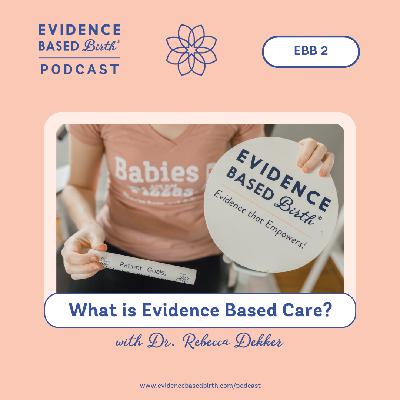

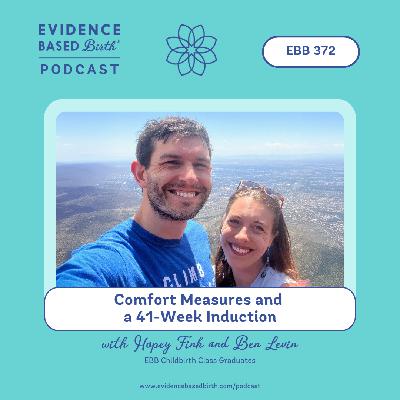
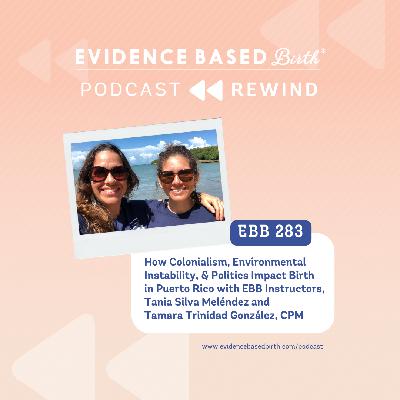
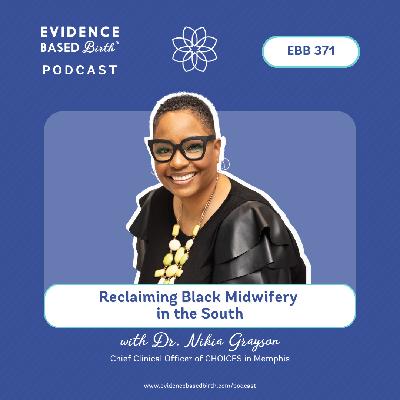
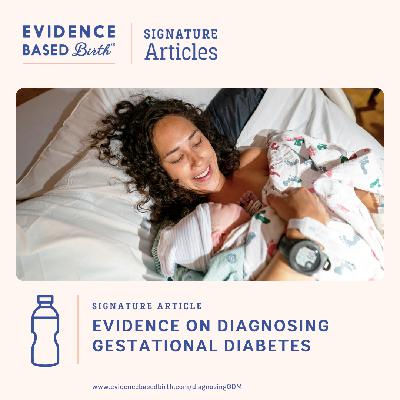
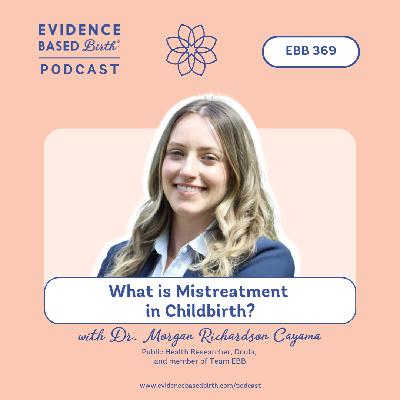
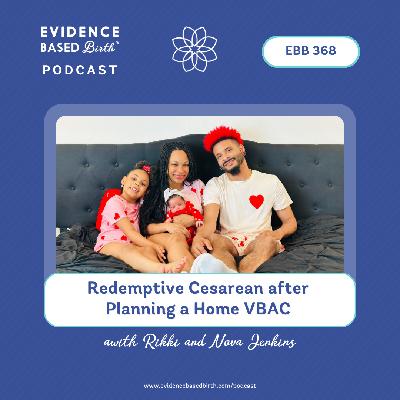
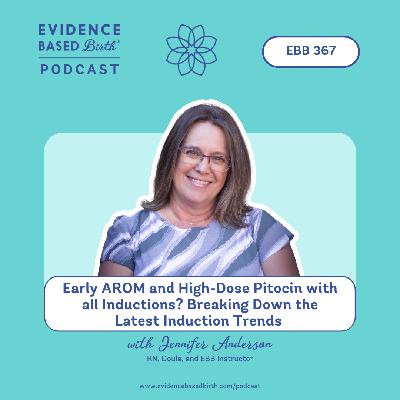
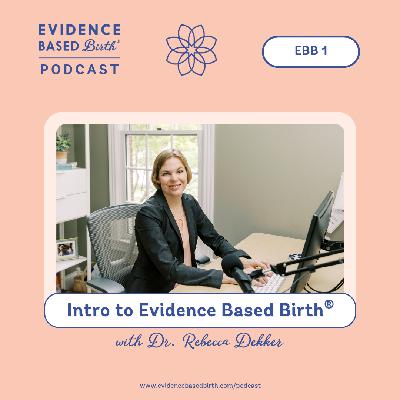
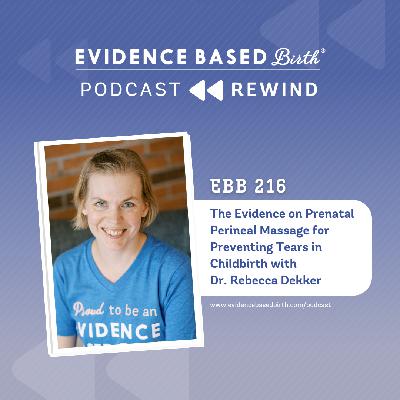
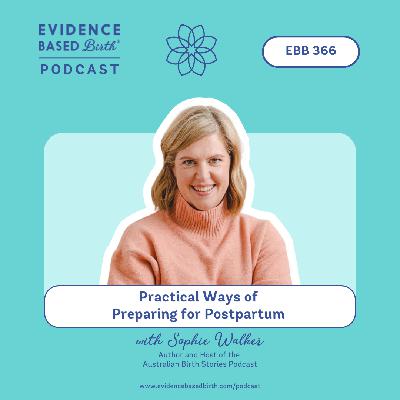
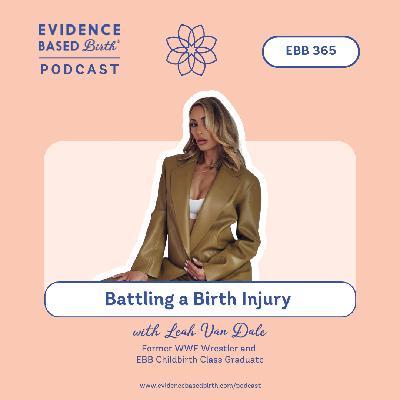
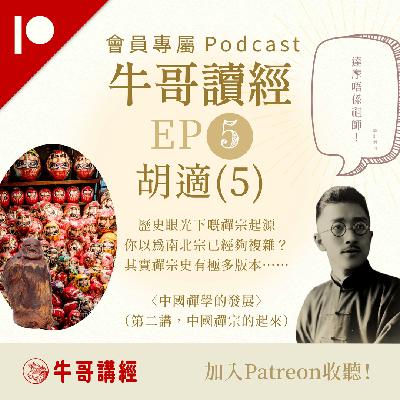
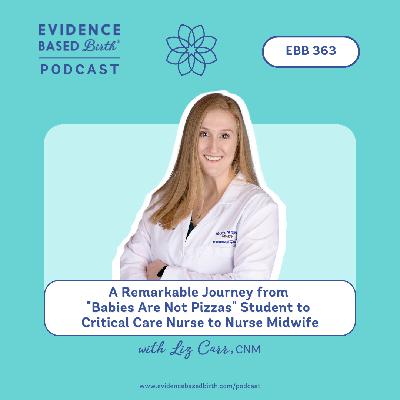
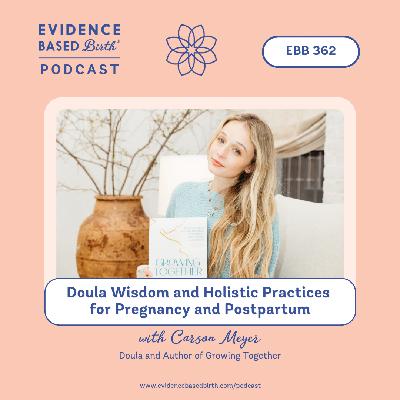
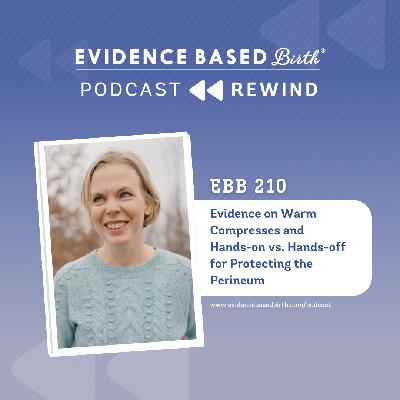
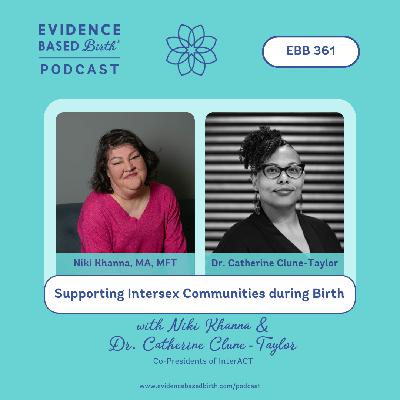
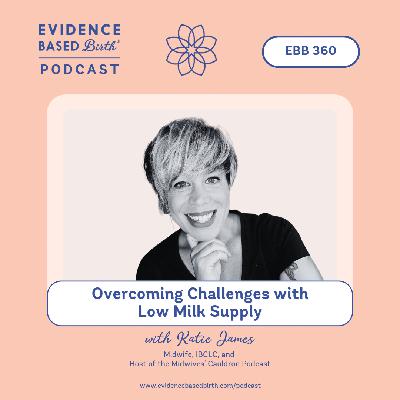



as always thank you for fact-based information. I have one miss giving on your comment that there were no major benefits to the massage. what about the couples interaction what about Partners helping with the massage what about the partner feeling that he is doing something to help with the birth you only looked at the perineum and not the benefits to the couple their intimacy and our time together there are benefits that were not discussed that immediately popped in my mind upon hearing your final review I love listening to your podcast .thank you T. D'Souza
This doctor really wasnt helpful at all. Her ridiculous story of excessive measures to get pregnant is going to apply to barely anyone.